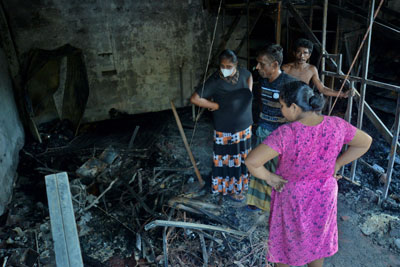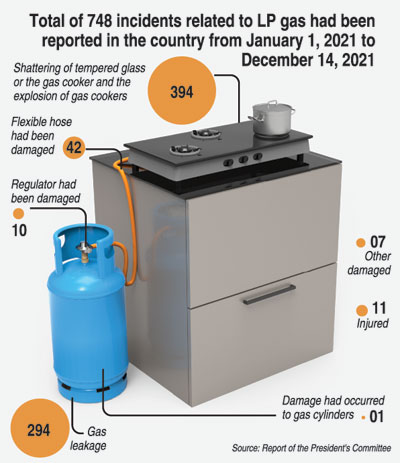News
Blowing the lid off gas explosions that shook the country
View(s):The Sunday Times reveals hitherto unpublicised findings of the committee set up by then President Gotabaya Rajapaksa, to investigate and propose solutions to “fires and explosions related to gas cylinders” after obtaining report through a hard-fought application under the Right to Information Act
By Namini Wijedasa
It was one of 2021’s most shocking stories: hundreds of gas explosions that damaged property and life and were linked to at least three deaths. But to date, there has been no official valuation of the total losses.
The accidents were reported countrywide, on a scale never before experienced. Police reports pointed to over 730 incidents between November 1 and December 15. When the Sunday Timesthis month asked for a complete list, the Police Department’s media unit said it didn’t have one.

Police reports pointed to over 730 incidents between November 1 and December 15, 2021 (pic by Eshan Fernando)
As the count rapidly increased, consumers quaked at entering their kitchens or storing cylinders inside their homes. Under pressure, Gotabaya Rajapaksa, the then President, set up a committee of scientists to investigate and propose solutions to “fires and explosions related to gas cylinders”. Its findings weren’t released to the public—until now. (We obtained the report through a hard-fought application under the Right to Information Act).
As consumers scrambled for answers, Thushan Gunawardena, who was Executive Director of the Consumer Affairs Authority (CAA) at the time, argued forcefully that gas companies were selling LPG with higher propane content than before and that this was causing the fires. He had even pre-warned of serious danger.
Not only was he fobbed off, Mr. Gunawardena was targeted so vehemently (he also blew the whistle on multiple other scams) that he quit and left for Australia, where he now works. He recently presented an affidavit to the Court of Appeal for an ongoing case.
Despite growing suspicions that something was amiss, the gas companies—significantly, the State-owned Litro Gas Lanka—maintained nothing was wrong with their product. It was literal gaslighting.
In their 2021 testimony to the Human Rights Commission of Sri Lanka (HRCSL) seen by us, Litro representatives held there was still no scientific proof that a change in gas composition had set off fires or explosions. They said the incidents were caused by substandard gas stoves, regulators and other paraphernalia. And that, while there had been reports of deaths from gas accidents, police inquiries pointed to reasons such as suicide, clothes catching on fire and use of gas “for other purposes”.
With the total collapse of the economy, the matter was buried. Still, in June 2022, we filed a request with the Presidential Secretariat under the RTI Act for the committee report on gas explosions and fires. It was rejected on the legal grounds that “the disclosure of such information would cause grave prejudice to the prevention or detection of any crime or the apprehension or prosecution of offenders”.
The Secretariat contended that releasing the report would harm the ongoing investigation. It remains unclear who handles this “investigation”, whether it is still open, was ever done or what its outcomes were.
In December 2022, we re-filed the RTI request with the Secretariat. It was rejected again. This time we were told it wasn’t available at the Secretariat. The report had vanished. On appeal, however, the Designated Officer retrieved a fresh copy from its authors and released it to us.
The findings confirm what Mr. Gunawardena had described and predicted. The eight-member committee said samples of stocks distributed by both Litro and the private sector company, Laugfs Gas, contained a higher percentage of propane when compared with older samples. This caused an increase in pressure within the cylinders which triggered the accidents.
The percentage of ethyl mercaptan—which gives LPG its distinctive odour and forewarns of leakage—was lower than recommended in the samples sold during the period in question.
The companies appeared to have used loopholes in existing standards as well as technical and administrative weaknesses in the regulatory process to their advantage, the committee said, adding all relevant rules and regulations pertaining to LPG and accessories must be amended.
When questioned by the committee, the companies repeatedly said (verbally) that there had been no composition change of their LPG; and that the propane percentage was 30 and the butane percentage was 70.
But the committee observed from test reports of samples collected in September, October and November that the propane mass was significantly higher. Another seven samples of Litro LPG tested in the laboratory of the Sapugaskanda oil refinery revealed as much as 40-46 percent of propane mass. 
While Litro had relied on an Oman-based company named Geochem for scientific analyses, its results were based on expired samples and were rejected by the committee. Meanwhile, extracts from five Laugfs cylinders were tested at the Sapugaskanda oil refinery and were also found to contain a high propane mass of 42-46 percent, the committee said.
In a letter to the CAA Chairman annexed to the report, Prof. Shantha Walpalage, Head of the Moratuwa University’s Department of Chemical & Process Engineering who led the committee, wrote that they observed a significant increase in saturated vapour pressure and a significant reduction in ullage volume (the gap between the surface of the liquid and the top of the gas cylinder) when LPG composition changes from 20 percent propane and 80 percent butane to 50 percent propane and 50 percent butane.
“This is a serious concern as the maximum operable pressure of the majority of LPT regulators available in the local market is indicated as 6-bar,” Prof. Walpalage stated. “These are suitable for low-pressure applications. Even at 30C, the vapour pressure of 50/50 composition reaches the threshold limit of these low-pressure LPG regulators. As a result, even a slight increase in ambient temperature can result in malfunctioning of these LPG regulators resulting in two types of gas-related explosions.”
This meant that the types of equipment in the Sri Lankan marketplace, including regulators, were not suited to the composition change the gas companies had surreptitiously carried out and of which consumers had no knowledge.
Among other findings, the committee revealed that, despite writing to both Litro and Laugfs for information about the actual foreign manufacturer of their LPG, the companies did not divulge its name. There was a possibility, therefore, that even if a supplier were to be blacklisted, the manufacturer could sell stocks through an alternative party, the committee warns.
The committee made several recommendations, as did the HRCSL. The Sunday Times sent these to Litro, the CAA and the Sri Lanka Standards Institution to check the status of implementation. Litro (despite several reminders) and the CAA did not respond.
SLSI said it had updated or was in the process of updating the relevant standards and had taken action to include LPG gas under its import inspection scheme. It had also started testing LPG gas at the time of importing. “After this action, no issues/explosions with regard to LPG are being reported,” said M. S. S. Fernando, Director (Engineering Standardisation Division).
One of the HRCSL’s recommendations was that all the incidents be identified together with the police and valuations carried out as soon as possible by the Government Valuation Department giving due consideration to the market value of the damaged equipment, etc. The Chief Government Valuer said this week that such a request never came.
It was not possible to determine what changes Litro had made to their systems as our queries were met with silence. But the committee, on inspection of the company, had found no evidence of any systematic adherence to quality assurance protocols in its workshop.
A key recommendation was that the Public Utilities Commission of Sri Lanka (PUCSL) be made regulator of the LPG industry. This has not been done.
It was also proposed to Litro and Laugfs that they print the maximum percentage of propane (by weight) on each cylinder; change valves every five years and keep records; to not change the composition of gas without prior approval; acquire basic quality control equipment and prepare and stick to a quality control plan, etc.
The best way to say that you found the home of your dreams is by finding it on Hitad.lk. We have listings for apartments for sale or rent in Sri Lanka, no matter what locale you're looking for! Whether you live in Colombo, Galle, Kandy, Matara, Jaffna and more - we've got them all!

